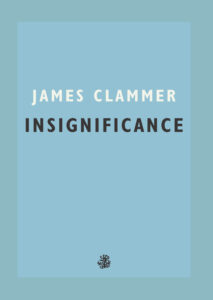
[Galley Beggar Press; 2021]
Joseph Forbes, or Joe as he prefers, is an ordinary man living in a nameless town of “marginal essence” in England. He is a plumber, returning to work after a serious illness of the “psychological variety.” He is, to all extents, an insignificant man. His job is perceived a simple job, one, he believes, his wife lined up in the hope of getting him back on track. But as Joe sets about lugging tools and removing valves, frustrated by the “unmanly biscuits” offered by customers, and aware that he might not yet be up to the job, the disturbing facts of his recent past slowly drip onto the page and the cause of his breakdown is revealed and, consequently, as the details of his disturbing family history are revealed, Joe’s seemingly humdrum life is shown to contain more of a significance than might be expected.
James Clammer’s debut novel, Why I Went Back, was a well received work of YA fiction when it was published in 2016, drawing comparisons to Alan Garner. Insignificance, his first adult novel is a modernist wonder that seems to take its inspiration, in part, from Virginia Woolf’s Mrs Dalloway (1925). Like Mrs Dalloway, Insignificance takes place over the course of a single summer’s day, Joe’s free flowing “thought pictures and mind words” cascade in the similar vein of Clarissa Dolloway: in long, unbroken segments of direct and indirect speech. It’s an uncapped stream of consciousness style that allows conversation, thought and description to become adjoined, clinging in seamless continuation. Both novels use thought rather than action to drive their novels, yet Clammer inverts the central role — unlike Clarissa Dolloway, Joe is not a member of high society, he is an ordinary working man. It’s an approach perfectly suited to explore Joe’s, unrarified, interior life, a man who thinks intensely but rarely speaks, who likes to keep his interiority watertight. It is thanks to Insignificance’s anonymous (and occasionally intrusive) narrator that Joe’s inner and outer world are allowed to seep onto the page because, without this intervention, this is not likely a story Joe himself would tell.
The ironic underlay of Insignificance is the significance of Joe’s insignificance. The depiction of his quotidian, unglamorous world creates a state of the nation backdrop, satirically commenting on the mundane blankness of English life, where towns are portrayed as featureless, uninspiring and ineffectual. Joe is a man who struggles to be a central figure in his own life, his wife’s life, and his son’s; not to mention he is in competition with the creator of Heaven and Earth when it comes to his wife’s attention and affection. Alison reads the bible or attends religious groups in the evenings, having given herself to God. At night, Joe drolly complains that she “shared the bed with another man, just to clinch the deal this man promised her the bonus of eternal life, a nice trick if you can get away with it.” Joe chooses to stay loyal as his wife developed an intimate relationship with God that surpassed their own. Like his namesake, Joseph, in the bible, who appears in scripture only as a name, he manages to fulfil his role without offering an opinion. A carpenter and a plumber, they are both humble, working men without a voice.
Alison, it turns out, began to embrace this other man (God) after their teenage son, Edward, (likely suffering from Capgras Syndrome, a delusional condition which causes him to believe Alison is not his real mother but a dangerous imposter), tried poisoning her with anti-freeze and was subsequently sent to prison for several years. Joe was powerless in his efforts to persuade Edward he was mistaken, despite explaining that he, as his father, was present at the birth, he saw it with his own eyes and therefore can verify that Edward’s mother is, indeed, his mother. But it doesn’t matter what Joe says, to Edward — as with others in this life — his voice isn’t significant, so Edward isn’t convinced otherwise and Joe fails to prevent the attempt on his wife’s life and the incarceration of his son. Years later, when Joe experiences a nervous breakdown, he believes it is the result of a delayed reaction to these past events and what he endured. His body finally reacts to the feelings he was concealing. Once again, Joe’s inability to view himself as possessing significance in his own unravelling world causes him to retreat, to remain hidden inside himself; and Edward’s actions added to an existing sense of defeat, bringing on further silence.
So, who is breaking this silence? Who is giving voice to Joe’s thoughts? Who is telling the story? Insignificance has multiple narrators. A central narrator reveals the story, but a further group of narrators involve themselves directly in the narrative and its progression, like supervisors making notes to the reader. For example, they are apologetic when the character of Alison is introduced so belatedly, but admit that they themselves were helpless in this. “Over our narrative Alison’s hovered,” they say, “for a time we wondered if she would arrive at all.” They hover and only interject when necessary, often to critique the central narrator — such as when he describes the physical appearance of female characters. “Something’s been overlooked,” they say, “presumably because our narrator, finding male bodies unattractive, has little to say about it other than the way in which it malfunctions, clearly he’s trying to elicit sympathy on the cheap.” This pleasurable slip into postmodernism, nodding toward the likes of John Barth, with comic, overarching narrators clarifying and quibbling with their central narrator, adds another layer to the novel’s study of significance. Whilst only occasional, the trick of reminding the reader they are being told a yarn — a made up story, with the pitfalls of error and subjectivity — suggests to the reader that the search for truth lies in the symbolic creation of Joe and his world, and that the novel’s significance lies beyond the story being told. For example, when Joe drunkenly stumbles into a busy road and escapes an angered driver by running into nearby woods, there is no description of the woods Joe enters because “the last thing anyone needs is more nature writers.” Cynical and jaded, even the storytellers question the significance of a story they describe as having “plebeian paucity”, in as much as the central concern of the novel is to relay the menial tasks of a working day, the small, insignificant gestures of fixing and mending a water cylinder rather than a grand ambition.
Because the “plebian” workplace novel is such a rarity in modern literature, particularly outside of the mode of social realism, it is gratifying that Insignificance revels in the specificities of Joe’s plumbing work because it rearranges the space inside the traditional novel. The reader’s pleasure is derived not from a story’s dramatic entanglements but the attentive, real world, technical detail given as Joe goes about his job — a point that is clarified by the narrators: “As regards our insistence upon these lengthy and somewhat technical descriptions, while objections are anticipated our narrator hesitates on the cusp of apology — the peculiarities of the life of the man Joseph grant him, perhaps, special dispensations.” Because the way Joe sets about his work, his technical knowledge and structure is significant to him. His work shapes who is. An ability to ply his trade successfully, comforted by practical and mechanical reasoning, makes sense – work is something he can talk about without fear of compilation. The relationship between manual work and character identity sits within a strain of British writing, which manages to encapsulate workplace mundanity with bleak, stylised comedy, in the same way Magnus Mills’ early novels did with their high tensile fencers, milkmen and delivery drivers. Both Clammer and Mills employ a philosophy of life that stems from technical, manual work. Whether it is mending water cylinders or driving buses, the nature of time, organisation and mechanisms are essential requirements to living. There is order and efficiency which brings meaning to existence and, in turn, significance too.
The arrangement of voices in Insignificance allow characters to spread into society at large, a place where Joe and even the narrators, at times, seem to come unstuck. By portraying a seemingly insignificant but accurate world, Clammer provides Joe, and all he encompasses, with authenticity and a working life that calls for craft and clarity of thought, suggesting that work can provide an alternative mode of being. In doing so he has managed to produce a novel that in its own charming, offbeat, blue collar way, feels highly significant indeed.
Simon Lowe is a British writer and journalist. His stories have appeared in Breakwater Review, AMP, Storgy, Firewords, Ponder review, and elsewhere. He has written articles about books and society for the Guardian and BBC worldwide. His new novel, The World is at War, Again, was published in 2021 (Elsewhen Press).
This post may contain affiliate links.







